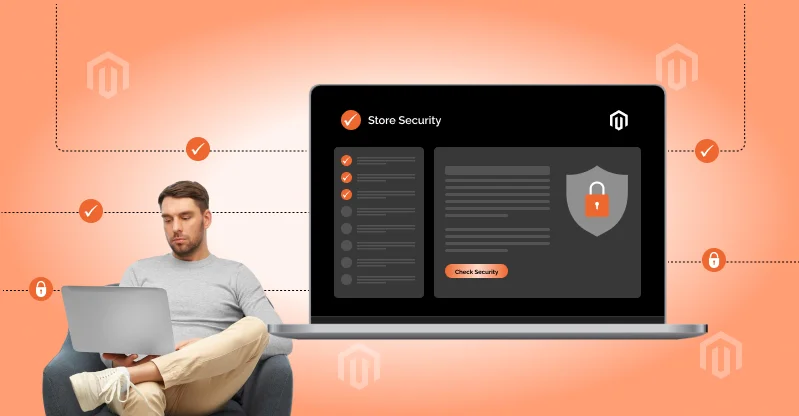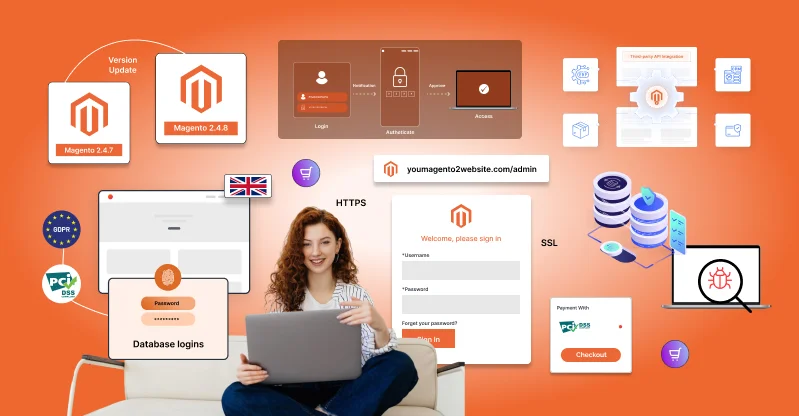Protect Your Magento Store: eCommerce Best Practices

Table of Contents
Having an online store on Magento allows you a degree of scalability and flexibility that no other platform can match.
Such power, though, brings with it an equally enormous responsibility—the duty of protecting your store from cyber attack, data breach, and fraud.
For UK eCommerce retailers in the global world we now inhabit with the internet, the threat is building day by day, with online crime costing the value of £21 billion per year today.
As a Magento store owner or admin, you’re not only safeguarding transactions—you’re safeguarding customer trust, brand reputation, and sales.
We’ll be discussing number one best practices for securing your Magento store, actionable best practices for the UK, and best practices on how to make your eCommerce business strong against emerging threats.
Why Magento Security Matters to UK Businesses
Magento presents an opportunity for a thousand UK online retailers, from individual traders to industry blue-chips, to flourish.
As the nation’s eCommerce sector had been predicted to reach £260 billion by 2025, retailers from the UK present golden opportunities to cybercrime groups.
One compromise is catastrophic. It results in chargeback loss, fees, and attorney fees. It can result in regulatory problems in GDPR legislation.
Other than that, a breach kills customer trust, hurts your reputation, and can even cause downtime for your company that’s closing deals. That’s why securing your magento website isn’t an option—it is a business-critical requirement.
Securing Your Magento Store: Best Practices
Magento and Extension Updates
Magento releases security updates and patches at intervals in an effort to remain secure from attack. Security threats are created by old systems, and it need to be updated with the latest version of Magento.
That should comprise the original software and the third-party extension and themes, and those would need updating from safe sources only.
British businesses need to enrol on the Magento Security Centre so they can be sent regular notice of new patches by email. Patch outside of off or non-UK shopping hours to cause minimal disruption to customers.
Install in a Secure Hosting Environment
Your hosting provider is a significant contributor to the security of your Magento store in general. Be sure to choose a UK or EU GDPR-registered host partner that provides dedicated firewalls, malware scanning, DDoS protection, and automatic backup.
For card payment-processing businesses, PCI DSS is also critical. Magento performs better on dedicated or cloud hosting than on shared hosting, which is more vulnerable to attack.
Secure HTTPS with SSL Certificates
British customers want to see the padlock icon when they’re shopping on the internet, ensuring their information is safe.
Applying the SSL certificate will encrypt all data transfers between your site and users. It is strongly advisable to implement SSL on your whole site, not just checkout, and to compel a redirect of all HTTP traffic to HTTPS.
Adding TLS 1.2 or later adds extra encryption and future-proofs you. Bonus: Google likes HTTPS sites that rank higher in search engine results, so you get SEO and security too.
Safe Admin Panel
The Magento admin panel is particularly tempting for cybercrooks. To minimise risks, you would do well to change the default “/admin” URL to some other custom URL, less easy to find for hackers.
Having 2FA enabled for every admin login provides an extra layer of security. IP lockdown locks down so that you can only log in from trusted machines, and tracking admin accounts at all times enables you to review idle users who might be holes.
If you’re working with external agencies or magento developers, get them to use restricted admin roles rather than full super admin privileges.
Hard Password Policies
Weakest passwords provide the best entry point to the crooks. To secure your store, use stringent password policies with a minimum of 12 characters consisting of both lower and upper case letters, numbers, and special characters. Require your employees to change passwords every 90 days and never allow them to reuse the old familiar password. Applying it to your customers too is equally good.
By compelling them to generate strong passwords and providing 2FA as an alternate checkout option, you prevent fraud and account takeover.

Secure Payment Gateways
Secure payment is the nightmare of the UK consumer. Payment via PCI DSS-compliant payment gateways like Stripe, PayPal, or Klarna renders your sensitive payment information never stored on your Magento server.
In addition to PCI compliance, you’ll also have to enable 3D Secure 2.0 for your site, under the UK’s PSD2 directive. This adds an additional layer of card payment verification. Not only does it bar the bad guys, but it also ensures the consumer that your site is safe to shop.
Install a Web Application Firewall (WAF)
Web Application Firewall (WAF) is also a fine defense against cyber attack via SQL injection, cross-site scripting, and brute-force login.
A WAF example is that it secures your website from accessing malicious requests by blocking and scanning traffic to your website.
Two companies that are extremely easily integrable with Magento and provide additional eCommerce website security are Cloudflare and Sucuri.
That you’re able to reverse through what’s blocking each now and again also informs you somewhat what sort of attack your store is facing and lets you adjust your rules.
Backup und Disaster Recovery
No matter how secure your store is, you need a worst-case scenario backup.
You have your database and files automatically backed up every day so that you can restore your store properly in case something goes wrong.
Offsite or encrypted cloud backup of your backup is a form of insurance. UK businesses will also make sure their backups are GDPR compliant if they are holding customer data.
Having your recovery process performed on a regular basis every two months or so will also have the benefit of enabling you to recover fast when your company is breached.
Malware and Vulnerability Monitoring
Regular checks mean issues get caught before they become issues. Free Magento Security Scan Tool is an effective tool that checks for known vulnerabilities on your website. Make use of it in combination with third-party tools like Sucuri or Astra to ensure maximum security.

Server log monitoring also provides the opportunity to detect suspicious activity, like frequent failed login attempts or unusual traffic.
UK businessmen should be particularly vigilant against fake orders as they are increasingly being made through online purchasing.
Train Your Team
Regardless of how high-tech your security is, operator error can still fail you. Your team must be taught how to identify phishing attacks, safeguard sensitive customer data, and utilise strong authentication credentials.
Teach them to inform someone immediately when they notice something suspicious and not brush it off.
Most data breaches in the UK occur as a result of employee error, and training them on a periodic basis will reduce risk by a considerable amount and get your employees familiar with threats that exist.
Advanced Magento Security Tips
For the larger UK businesses, even more sophisticated measures need to be employed. Adding a PHP-based Content Security Policy (CSP) puts a stop to malicious code injection on your website.
Adding Google reCAPTCHA to your login and checkout pages will stop automated bot attempts. Plugins like MageFence or Watchlog put an extra level of vigilance, notifying you of unauthorised attempts.
And lastly, but certainly not least, penetration testing by experts in cybersecurity who are simulating actual cyberattacks reveals vulnerabilities prior to hackers.
Active Complaint against UK and EU Legislation
On UK Magento sites, General Data Protection Regulation (GDPR) still persists post-Brexit, where you have to safeguard customer information, gain explicit permission, and offer erasure on request.
You have to be PCI DSS compliant if you process card payment details on your site. Additionally, PSD2 regulation also requires Strong Customer Authentication (SCA) on UK online payments. Otherwise, it can attract ginormous fines by the Information Commissioner’s Office (ICO) and hence permanent compliance is the future.
Explore Related Topic: The Future of UK Online Shopping: Top Magento E-commerce Trends
Conclusion
Your Magento store belongs to a process that is executed on a recurring basis, not a standalone process.
As cybercrime develops by the minute, UK internet businesses have to be on the bleeding edge with updates to systems, employee training, and buying ruthless software.
With SSL encryption, web application firewalls, backups, and UK standards compliance, you can create a haven for your clients.
And most importantly, proper security not only secures your profit but also makes you a reliable UK eCommerce brand. Connect with a Magneto expert to ensure you know all the security practices to protect your store without any glitches.
FAQs
 How frequently must I update my Magento store?
How frequently must I update my Magento store?
You must update Magento core, themes, and extensions the moment releases are available. Don’t waste your time to update, and your store falls into the hands of hackers in search of vulnerable systems.
 Is Magento secure enough for small UK businesses?
Is Magento secure enough for small UK businesses?
Yes, Magento is very secure if implemented right. Small businesses also have to apply security patches, host on a secure web hosting environment, and install security plugins by default to safeguard customer data.
 What is the most secure payment option for a UK Magento website?
What is the most secure payment option for a UK Magento website?
The most secure are PCI DSS-compliant payment gateways like PayPal, Stripe, or Klarna. They also offer PSD2 Strong Customer Authentication, which is now mandatory in the UK.
 Do I require a Magento security extension?
Do I require a Magento security extension?
Extensions are not necessary, but they provide an extra layer of security by notifying of suspicious activity, hiding from unauthorised users, and providing additional report functionality.
 My Magento site has been hacked. What do I do now?
My Magento site has been hacked. What do I do now?
If your site has been hacked, put it offline immediately to prevent additional compromise. Roll the site back from a good backup, reset all systems’ credentials, update for security, and rescan completely for malware before putting it back online live again.



